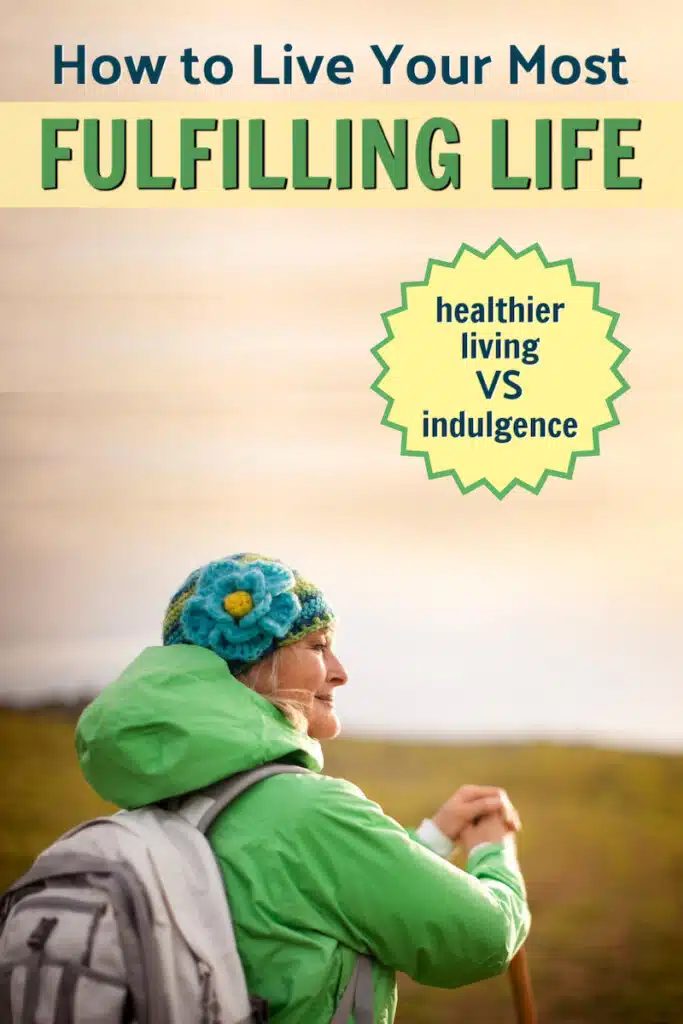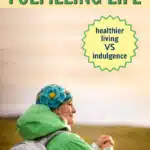Do you feel deeply satisfied with your life? Would you be happier if you were healthier? We all want to live a fulfilling life – one where we feel energetic, happy, and make the most of every day.
But getting healthier is about way more than broccoli and pushups.
It’s about tapping into some science-backed techniques and lifestyle shifts – that will leave you wondering why the heck no one told you about this stuff sooner.
Here’s what you need to know about living your most fulfilling life, including.six surprising ways to get healthier and more fulfilled than you ever imagined possible.
A video is included which should prove helpful.
Is a Healthier Life More Fulfilling?
Sometimes it’s confusing to know whether to live indulgently in-the-moment, or, to plan for a long lifespan.
On one hand, there are no guarantees and we must live life while there is still life to be lived.
That seems like common sense, but it’s too tempting to postpone living boldly for some imaginary time in the future when you expect to have more time, energy, or wherewithal.
On the other hand, what if we live to be 90 or 100, or beyond? We want the last decade of our lifespan to be as enjoyable and as pain-free as possible, and so we wonder, maybe it’s smart to delay short-term gratification so the final years are better?
In truth, none of us knows how long we have to live:
- If there’s a chance you might die next week, does it mean you should choose indulgence over living healthier this week?
- Wouldn’t the rest of your short life be more fulfilling if you had donuts for dinner and played computer games – rather than eating a vegetable salad and going to the gym?
Not necessarily.
The Art of Fulfillment and the Science of Healthy Living
Fulfillment refers to a deep sense of satisfaction and completeness arising from living in alignment with your values, aspirations, and authentic self.
How fulfilled is it possible to be?
Fulfillment encompasses a feeling of wholeness and meaningfulness in most aspects of your life, including your relationships, work, personal growth, and overall well-being.
It just seems to make sense to celebrate the process of enhancement, to see that small, incremental changes can lead toward better health and appearance, and to understand that your life – no matter how efficient or satisfying it may seem – can always be improved.

As a human, if you want to experience a deep sense of fulfillment, you will likely have to look beyond fleeting happiness or in-the-moment pleasure and into building situations that leave you feeling purposeful and accomplished.
These six unexpected, science-backed methods will help you get started.
1. Make Acquaintance with All Age Ranges
Hang out with younger people, and also hang out with people older than you.
Scientists say having friends from younger generations can actually help keep your brain agile and spirits high as you age.
Their fresh perspectives and different life experiences engage your brain in new ways. So go make friends with someone a decade or two younger than you – you’ll get a brain boost while scoring cool points for being that awesome older friend.
A study by researchers at Harvard found that having intergenerational relationships can help make you healthier. For example, positive relationships with people decades younger helped older adults feel more embedded in society and had a revitalizing effect.
Conversely, hang out with older folks. Avail yourself of their wisdom and their different perspective. Listen to what they’re saying, but also try to read between the lines and try to glean lessons from the life they’ve already lived.
A study highlighted by ScienceDaily found that social interactions, which can be a significant part of engaging in group-based creative activities, can improve cognitive function in older adults. The study observed that older adults who were lacking certain types of social contact experienced a boost in cognition on days when they had more social interactions than usual.
2. Self-Care is Good, But Challenge Yourself, Too
It’s nice to pamper yourself, too, but the opposite can also be good. For example, try taking freezing cold showers.
Subjecting your body to cold therapy like ice baths or even just a freezing shower can spark transformative health benefits.
We’re talking better immunity, increased metabolic rates, reduced inflammation, and a natural high that lasts for hours. It’s brutal at first, but you’ll get addicted to the recharge.
A Netherlands study established that exposure to cold temperatures through cold showers can lead to improved immune responses and metabolic health benefits.
3. Wiggle Your Toes and Get Grounded
Reconnecting your body to the gentle electrical charge of the Earth has been shown to reduce stress while giving you more energy. So, go barefoot more often.

It’s called “grounding” or “earthing” and it’s a free life hack. So ditch your shoes and wiggle your toes in the grass or sand as much as possible.
A pilot study published in the Journal of Environmental and Public Health found that grounding or earthing by having direct skin contact with the earth reduces inflammation and promotes improved health.
4. Be a Productivity Enthusiast, But Also, Be a Lazy Good-for-Nothing
Productivity systems can be enormously helpful for staying on track with goals and getting more done during a typical week, leaving you with a feeling of accomplishment.
However, it’s also helpful to do absolutely nothing for 15 minutes each day.
Nope, not meditating or anything active. Literally schedule 15 minutes to just lay horizontally and let your mind wander without any distractions or goals besides pure rest. This quick recharge lets your body’s systems hit the reset button in a way active relaxation can’t provide.
Multiple research studies have indicated that giving your brain a brief period of awake, unbounded rest allows it to integrate information better and solidify memories more effectively.
5. Watch More Comedies Than Dramas
It can be energizing to watch the occasional horror film or listen to the latest true crime podcast. But a little of that stuff goes a long way.
It’s more important to laugh your ass off daily.
Laughter really is incredible medicine. Finding ways to get deep, doubling-over belly laughs every single day floods your body with endorphins and oxytocin. It reduces inflammation, boosts immune function, and even protects your heart. Laughing frequently could extend your life!
So sure, once in a while, a brutal action film can be stimulating, but be sure to read that comedic memoir and see the latest sketch comedy show, too.
Laughter therapy programs have been shown in studies to reduce stress, anxiety, depression, and insomnia while improving quality of life. Genuine laughter increases endorphins and other positive hormones.
6. Unleash Your Inner Artist
One of the pitfalls of getting older is that you stop doing arty stuff. As a kid, you doodled, went to band practice, played soccer, auditioned for the school musical.
Now, you just work.
You don’t have to be Picasso. Any creative outlets – writing, playing music, drawing or designing – improve cognitive function while allowing you to process experiences and emotions.
Making art also reduces stress while giving you a sense of purpose. Consider picking up that long-abandoned hobby again.
Research has found that creative pursuits improve cognitive functions and emotional resilience while providing a sense of personal growth, particularly in mature adults. For instance, a study led by Julene K. Johnson, Ph.D., at the University of California, San Francisco, found that participation in a community choir program improved the quality of life, reduced feelings of loneliness, and increased interest in life among older adults.
Another study published in PLOS ONE focused on the broader category of leisure activities, encompassing both creative and other types, and found that these activities are positively associated with cognitive function, physical function, and mental health in older adults. The research suggested that engaging in creatively stimulating activities can help preserve cognitive function, supporting the “use it or lose it” hypothesis, which posits that intellectual engagement can slow cognitive decline.
Striking a Balance: The Meaning of Indulgence
Fulfillment is a subjective experience.
What brings fulfillment to you might be different than what fulfills someone else.
What matters most is finding and cultivating the elements of your life that resonate with your individual values, aspirations, and desires. Doing this can help foster a greater sense of purpose and lasting contentment within you.
Generally, moving toward things that feel good is a wise idea.
Pleasure-seeking and instant gratification are not always bad things. After all, the feeling of joy is one of life’s greatest gifts. And choosing sensualism, hedonism, or indulgence over long-term planning can help you remain present.
Mindful presence is a state of focused awareness and full engagement in the present moment without judgment or distraction.
Being in-the-moment involves directing your attention intentionally to whatever is happening in the here and now, whether it’s an internal experience (such as thoughts and emotions) or stimuli (such as sights, sounds, and smells).

The idea with presence is, if you’re going to eat the cookie, really slow down and taste it, experience the full flavor, texture, and sugar rush.
Indulgence is the act of allowing yourself to enjoy or experience something pleasurable, often in a self-gratifying or self-satisfying manner:
• Indulgence means satisfying your desires, cravings, or impulses, typically without strict restraint or moderation.
• Indulgence can pertain to many aspects of life, including sensory pleasures, material possessions, and behaviors that might not be considered strictly necessary or essential.
• Indulgence is a natural human inclination, and finding a healthy balance between embracing pleasurable experiences and maintaining responsible self-care is essential.
In some cases, indulgence can enhance overall well-being and provide a break from routine, but mindful consideration of the consequences and context is essential to ensure that indulgence remains a positive and enriching aspect of life.
The easiest way to determine if indulgence is worth it is to ask yourself if it’s harming yourself or others.
To do harm – to yourself or someone else – means you have to “turn off“ the part of your psyche that is compassion and empathy.
As soon as you switch-off your empathy, you’re no longer having a fully dimensional human experience.
In other words, you’re limiting yourself.
Speaking metaphorically, compassion, empathy, and kindness are the dynamics that take a human life from black-and-white into full-spectrum color.
Sometimes when the concept of Do No Harm is discussed, an undertone of moralizing, shame, or judgment comes with it.
But that is not the framework here.
This is about how to live your most fulfilling life. This is about embracing your humanity.
Finding the Balance Between In-The-Moment Pleasure and Careful Habits
At first glance, healthy living and hedonism might appear as polar opposites, but a deeper analysis reveals surprising commonalities.
Healthier living and indulgence are both lifestyles driven by the pursuit of happiness and contentment.
Hedonism is rooted in the pursuit of immediate pleasure, while aspects of healthy living – such as indulging in a piece of dark chocolate or enjoying a brisk walk – also provide immediate gratification. This shared characteristic shows that both approaches acknowledge the importance of satisfying our innate desires.
Both lifestyles aim to enhance one’s overall quality of life. Hedonism seeks to maximize pleasure and minimize pain, while healthy living strives to optimize physical and mental well-being. The underlying motivation is to experience life to its fullest potential.
Hedonism often involves being present in the moment to savor sensory pleasures. Similarly, engaging in mindful activities such as yoga or meditation as part of a healthy lifestyle encourages being fully present, fostering a deep connection between the mind and body.
On the other hand, you don’t have to look too far or wide to see modern examples of the perils of indulgence.
One example is the man who works hard to be a good financial provider for his spouse and children:
• Whether he is at home or at the office, the bulk of his mental and physical energy goes toward being powerful and capable in his profession.
• He’s often inclined to devote more energy to work than to having a lazy, relaxed hangout with his kids.
• He’s a good man – but also a stark reminder of the consequences of prioritizing work and financial success over health.
• To him, the buzz he gets from empire-building and being brilliant at work is an addictive high.
• Despite his potentially immense achievements at work, he tends to neglect health to pursue his ambitions. Irregular eating habits, stress-driven lifestyle, and avoidance of medical treatment for his health issues can harm his well-being.
Another example is the obesity epidemic and public health:
• Obesity has become a global concern over the past few decades and highlights the consequences of performing hedonistic pleasures without considering the long-term impact on health.
• The rise in sedentary lifestyles and excessive consumption of calorie-dense, unhealthy foods has led to widespread health issues, including cardiovascular diseases, diabetes, and various other chronic conditions.
These examples serve as reminders that embracing a lifestyle valuing healthier choices, mindfulness, and holistic well-being can lead to better outcomes in terms of health, longevity, and overall life satisfaction – especially when compared to the short-lived pleasures often associated with hedonism.
A Wise Choice: Opting for Healthier Living
While hedonism has its allure, healthy living emerges as the wiser choice for several compelling reasons.
Hedonistic pleasures offer immediate satisfaction, but they often fade quickly, leaving behind a longing for more.
Healthy living, on the other hand, provides a consistent, sustainable sense of well-being that endures over time.
The steady gratification derived from leading a balanced life contributes to lasting contentment.
Healthy living promotes physical fitness, mental clarity, emotional stability, and social connections. These interconnected facets create a comprehensive sense of holistic wellness, fostering a fulfilling life rich in meaningful experiences.
Developing healthy habits requires discipline, commitment, and self-awareness. These qualities cultivate resilience, enabling individuals to navigate life’s challenges with grace and adaptability.
In contrast, hedonistic pursuits might leave one ill-equipped to cope with adversity.
Prioritizing health reduces the risk of chronic diseases and enhances longevity. This proactive approach allows individuals to enjoy life’s pleasures for a more extended period instead of experiencing health-related limitations due to neglect.
Healthy living doesn’t advocate complete abstinence from pleasures. Instead, it encourages a balanced approach, allowing for occasional indulgences without compromising overall well-being.
This moderation ensures that pleasures are enjoyed without the negative consequences associated with excessive indulgence.
But the benefits don’t stop there.
Healthier choices provide a sort of accrued interest – compounded dividends – when compared to habitual indulgence:
Building Emotional Resilience: Delaying gratification requires self-control and the ability to tolerate discomfort in the short term. Managing impulse management cultivates emotional resilience, which is crucial for navigating life’s challenges. By learning to tolerate temporary discomfort, you develop a stronger capacity to handle stress, setbacks, and adversities, improving mental well-being.
Achieving Goals: Setting and achieving long-term goals is a fundamental source of personal satisfaction and self-esteem. You create a sense of purpose and accomplishment when you delay immediate pleasures in favor of working towards these goals. The fulfillment derived from achieving these milestones contributes significantly to overall happiness and life satisfaction.
Enhancing Self-Regulation: Delaying gratification involves exercising self-regulation, a key aspect of emotional intelligence. This ability to manage impulses and regulate emotions is associated with better relationships, improved decision-making, and a greater sense of self-mastery. These skills translate into improved mental health and more fulfilling interactions with others.
Conclusion on Choosing Healthier Living Over Habitual Indulgence
There are compelling reasons to delay gratification for the sake of greater health and happiness in the long term.
By cultivating emotional resilience, achieving meaningful goals, enhancing self-regulation, and aligning with your philosophical ideals, you foster your own well-being and contribute to a more fulfilling and purpose-driven life. This video explains:
Healthier living provides a sustainable sense of satisfaction and equips individuals with the tools to navigate life’s challenges and embrace its joys.
By fostering discipline, resilience, and overall wellness, the path of healthier living likely emerges as the wiser and more rewarding choice in the grand journey of your life.
Additional Resources on Living a Fulfilling Life and Delaying Gratification:
Eudaimonia, the Flourishing Life, and Philosophical Traditions such as Aristotelian Ethics – https://plato.stanford.edu/entries/aristotle-ethics/
Utilitarianism and Maximizing Happiness – https://en.wikipedia.org/wiki/Utilitarianism
Existential Fulfillment – https://www.ncbi.nlm.nih.gov/pmc/articles/PMC7016537/
Personality Traits of Successful Humans – https://www.psychologytoday.com/us/blog/your-emotional-meter/201712/the-benefits-delaying-gratification
